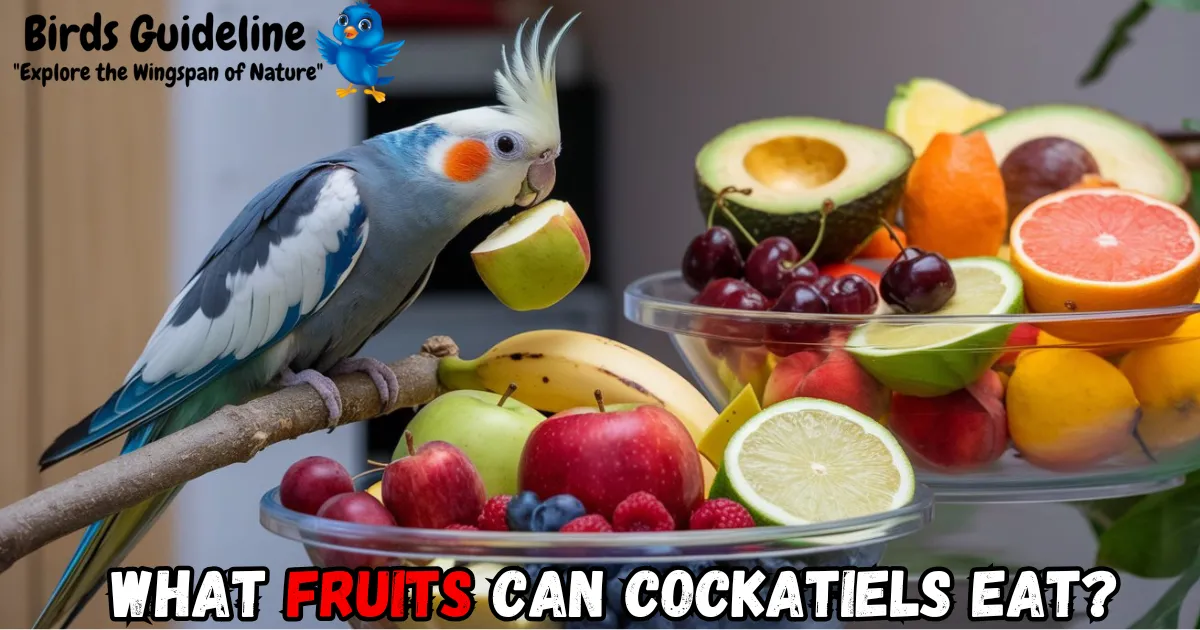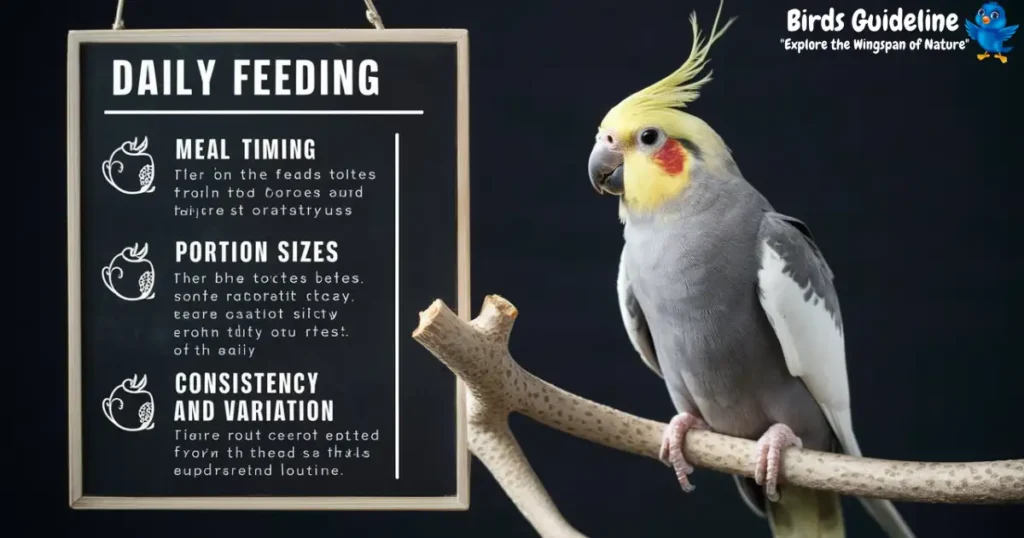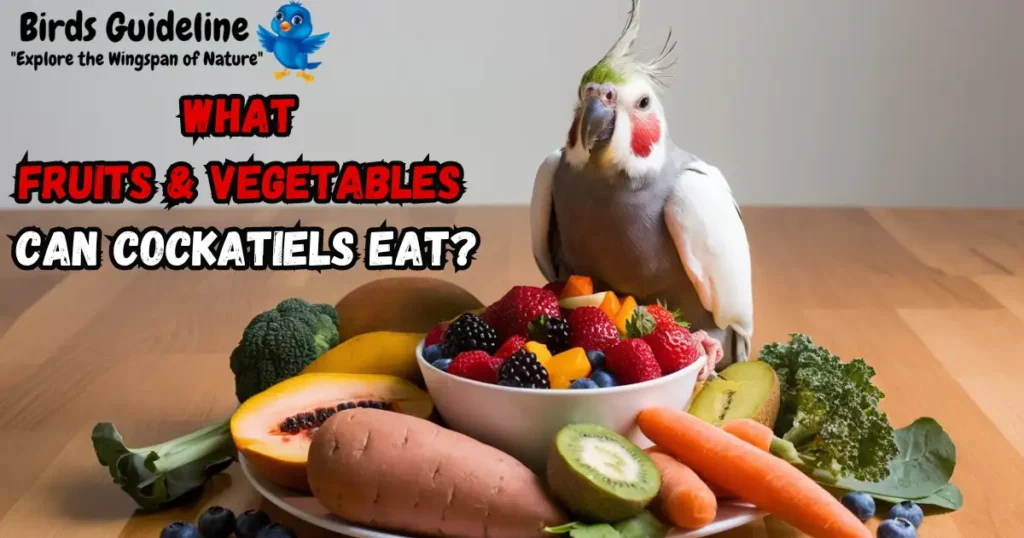Cockatiels can safely eat a variety of fruits including apples, bananas, and berries. Always remove seeds and pits before feeding them to your bird. From my studies as a bird wildlife expert, I’ve uncovered some exciting facts about which fruits are best for cockatiels. Keep reading to learn the best fruit choices for your cockatiel and how to safely prepare them for mealtime.
Safe Fruits For Cockatiels
Owners often wonder about safe fruits for their feathered friends. Cockatiels enjoy a variety of fruits, but it’s critical to know which are safe. Fruits like Apples (remove seeds), Bananas, different Berries, and Grapes can be part of their diet. These fruits provide essential nutrients and variety. It’s essential to offer them in moderation and properly prepared. Let’s look at the benefits and preparation methods for these cockatiel-friendly fruits.
Apples
Cockatiels can eat Apples, but always remove the seeds. Seeds contain harmful chemicals for birds. Slice apples into small, manageable pieces for your cockatiel. Apples are full of in vitamins and fiber. They can be a tasty and healthy snack. Never offer a whole apple to avoid choking hazards.
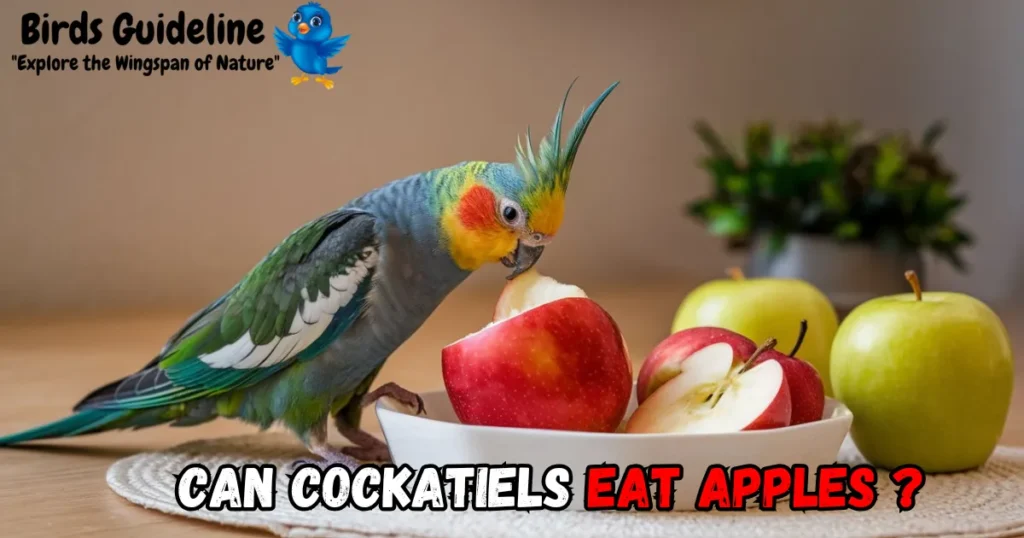
Bananas
Bananas are a great source of potassium and vitamins. Peel bananas before offering them to your cockatiel. Slice them into small chunks. This makes it easy for your pet to eat. Bananas can be a soft and enjoyable treat. Always offer in moderation to prevent obesity.

Berries
Cockatiels love Berries like Blueberries, Strawberries, Raspberries, and Blackberries. Berries are packed with antioxidants. They are small and easy for cockatiels to eat. Make sure to wash them thoroughly before serving. Berries offer a mix of sweet and tart flavors that birds find appealing.
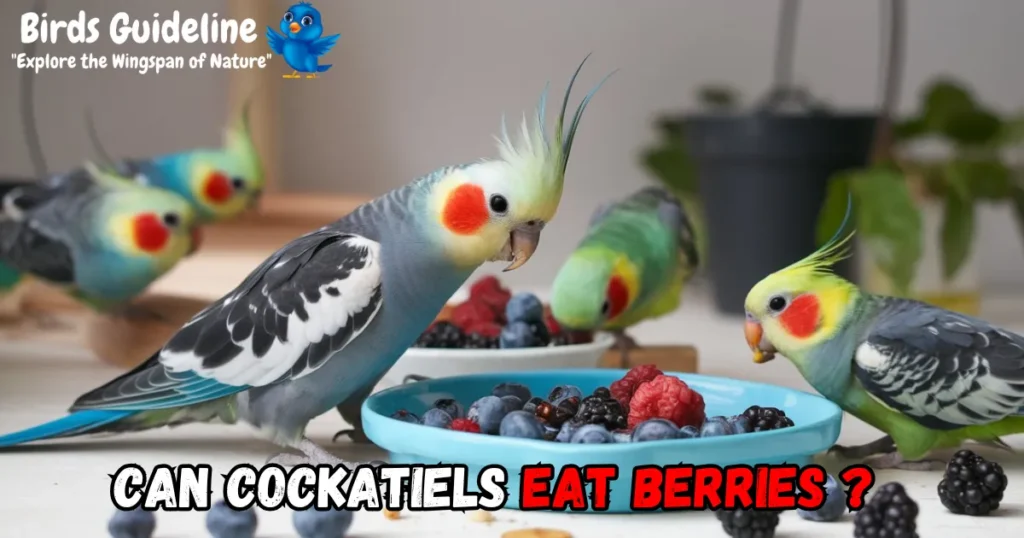
Grapes
Grapes can be a juicy treat for cockatiels. Cut grapes in half to make them a safer size. Grapes contain vitamins and water. This makes them a refreshing snack. Always watch your bird while they eat grapes. This guarantees they eat safely and enjoy their treat. Click here to know What Do Herons Eat?
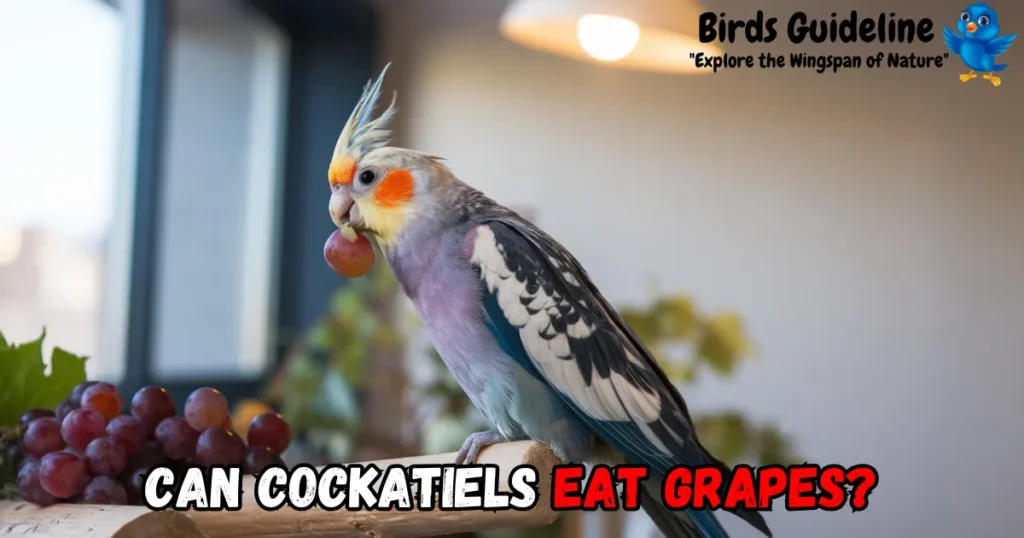
Fruits And Seeds To Avoid
Choosing the right fruits for cockatiels is crucial for their health. Some fruits and seeds can harm them. This guide will help you learn about safe and unsafe fruits for your feathered friend. Remember, not all fruits are safe. Certain ones can lead to serious health issues or even be fatal. It’s important to know which fruits to avoid to keep your cockatiel healthy and happy.
Avocado
Avocado is extremely dangerous for cockatiels. The entire fruit contains a toxin called persin. Persin can cause heart damage, respiratory distress, and even death in birds. Avoid feeding any part of the avocado, including the flesh, pit, and skin, to your cockatiel. There are many other safe fruits to choose from, so it’s best to keep avocado off the menu entirely.
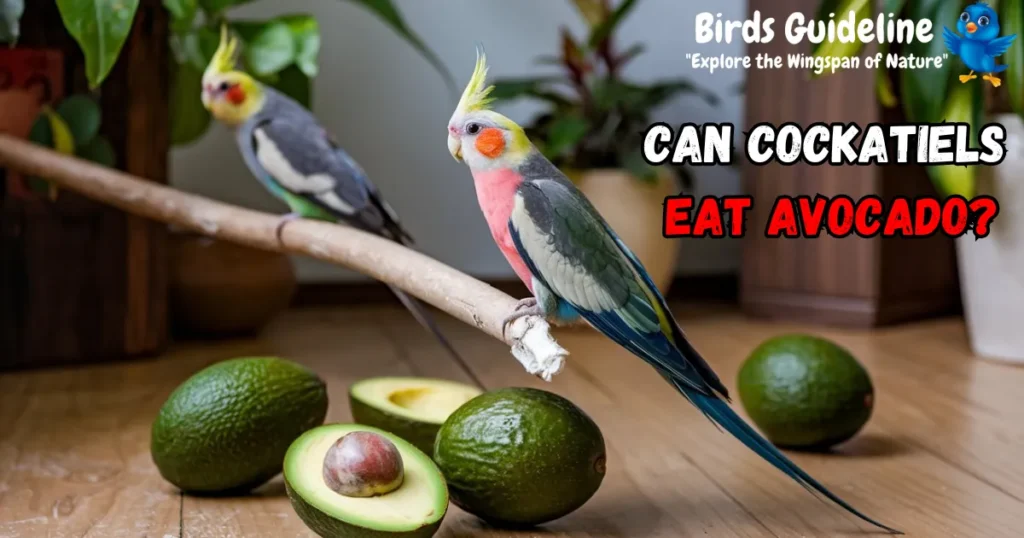
Citrus Fruits
While not as deadly as some other items, citrus fruits like grapefruit, oranges, and lemons should be offered in moderation. These fruits can cause digestive issues in cockatiels due to their high acidity. Feeding small amounts occasionally is okay, but frequent feeding can lead to discomfort and health problems. Instead, opt for fruits that are less acidic and more bird-friendly.
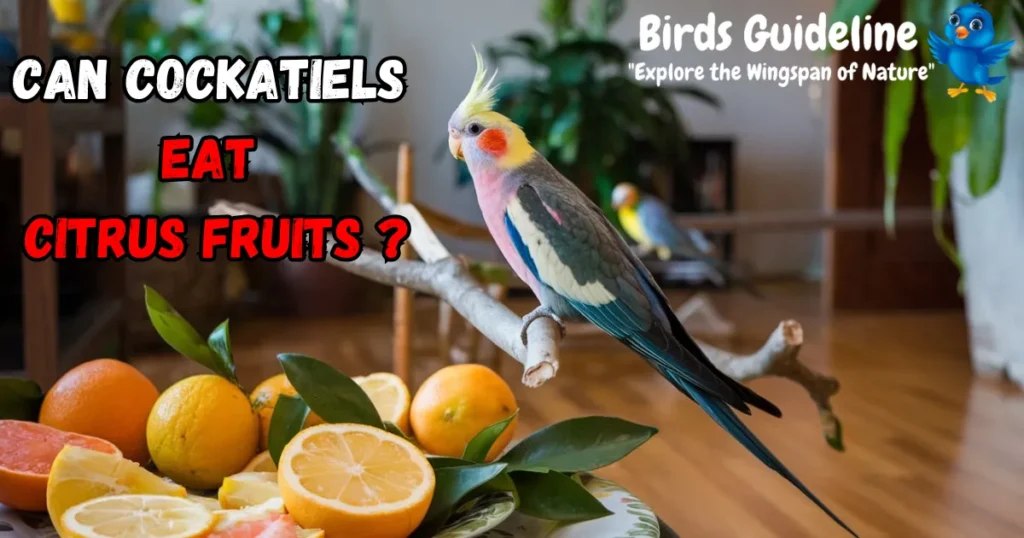
Cherries
Cherries can be a tasty treat for humans, but they pose a risk to cockatiels. The main issue lies in the pits, which contain cyanide. Cyanide is highly toxic and can be fatal to birds if ingested. If you choose to feed cherries, make sure they are pit-free. However, it’s crucial to remember that even pitted cherries should be given in moderation due to their sugar content.
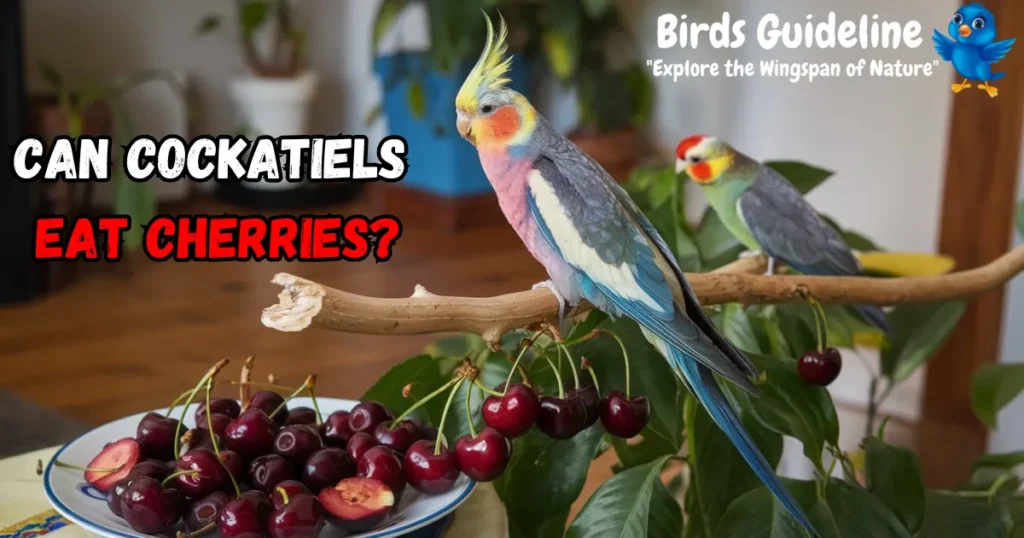
Peaches
Like cherries, peaches also contain cyanide in their pits. It’s essential to remove the pit before offering peaches to your cockatiel. The flesh of the peach is safe in small amounts, but the pit poses a significant risk of toxicity. Always make sure that any fruit given to your bird is free from pits and seeds to prevent accidental ingestion of toxic substances.
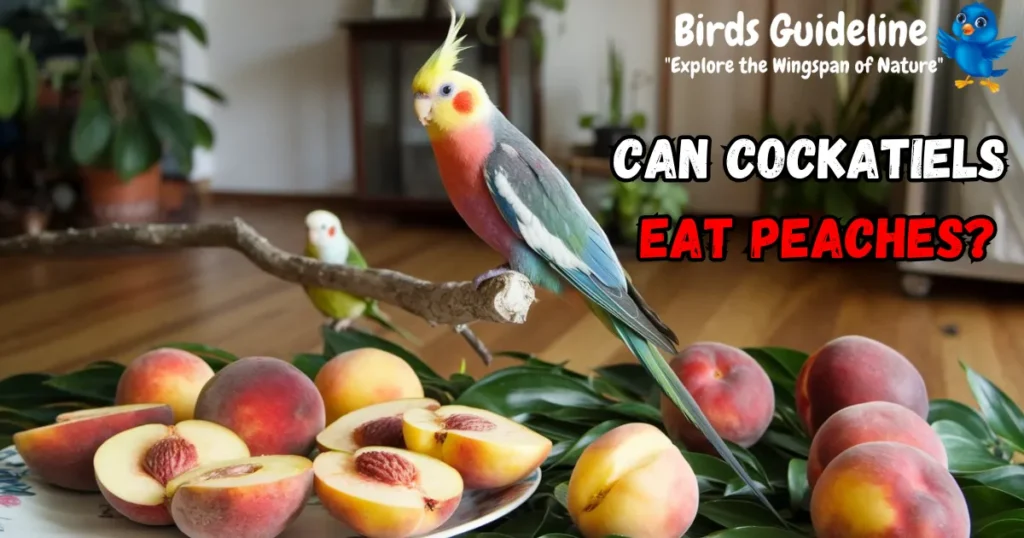
Nutritional Benefits
Many cockatiel owners often wonder which fruits their feathered friends can enjoy. Fruits are packed with essential nutrients that can greatly benefit a cockatiel’s health. Offering a variety of fruits can guarantee that these birds receive a balanced mix of vitamins, minerals, and antioxidants. It is important to understand the specific nutritional benefits that fruits provide to maintain a healthy and happy bird.
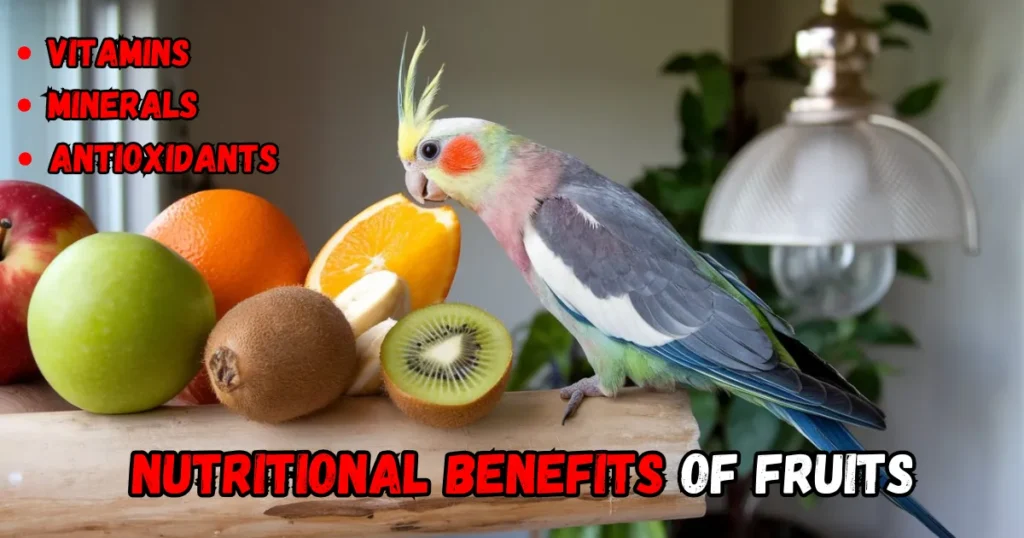
Vitamins
Just like humans, cockatiels need vitamins to stay healthy. Fruits are an excellent source of these vital nutrients. Each vitamin plays a unique role in a cockatiel’s body. For instance, Vitamin A is crucial for good vision and a strong immune system. Citrus fruits like oranges are packed with Vitamin C, which helps heal wounds and absorb iron. Here is a list of vitamins that cockatiels can get from fruits:
- Vitamin A: found in mangoes and apricots
- Vitamin C: found in kiwi and oranges
- Vitamin E: found in avocados (in moderation)
- Vitamin K: found in blueberries
It’s essential to serve these fruits in moderation as part of a balanced diet.
Minerals
Minerals support a cockatiel’s body in different ways. Calcium is vital for strong bones, while magnesium supports muscle and nerve function. Fruits can help meet some of these mineral requirements. For instance, bananas are a good source of potassium, which is necessary for heart health. Here are some fruits and the minerals they contain:
- Calcium: found in oranges
- Potassium: found in bananas
- Magnesium: found in strawberries
- Iron: found in prune juice
Remember to remove any seeds or pits from fruits, as these can be harmful to cockatiels.
Antioxidants
Antioxidants protect cockatiels from illness. They fight harmful molecules called free radicals. Berries, such as blueberries and cranberries, are full of antioxidants. Apples (without seeds) and grapes are also great choices. Here’s why antioxidants are important:
- They help prevent diseases.
- They keep a cockatiel’s immune system strong.
- They can slow down the aging process.
By giving your cockatiel fruits with antioxidants, you help them live a longer, healthier life. Always wash fruits thoroughly before serving to remove any pesticides or chemicals.
Serving Suggestions
Cockatiels love a variety of foods, and fruits are no exception. These colorful and sweet treats offer vitamins and fun for your feathered friends. But, knowing the right fruits and how to serve them is key. This guide will help you understand what fruits cockatiels can enjoy safely and how to present them properly.
Fresh Vs. Dried
Both fresh and dried fruits have their place in a cockatiel’s diet. Fresh fruits are full of water and nutrients. They are great for hydration and health. Dried fruits are less messy and can be stored longer. Yet, you must be careful with dried fruits. They are more concentrated in sugar. Always check that they have no added sugars or preservatives. These can harm your bird. Here’s a quick look at the pros and cons:
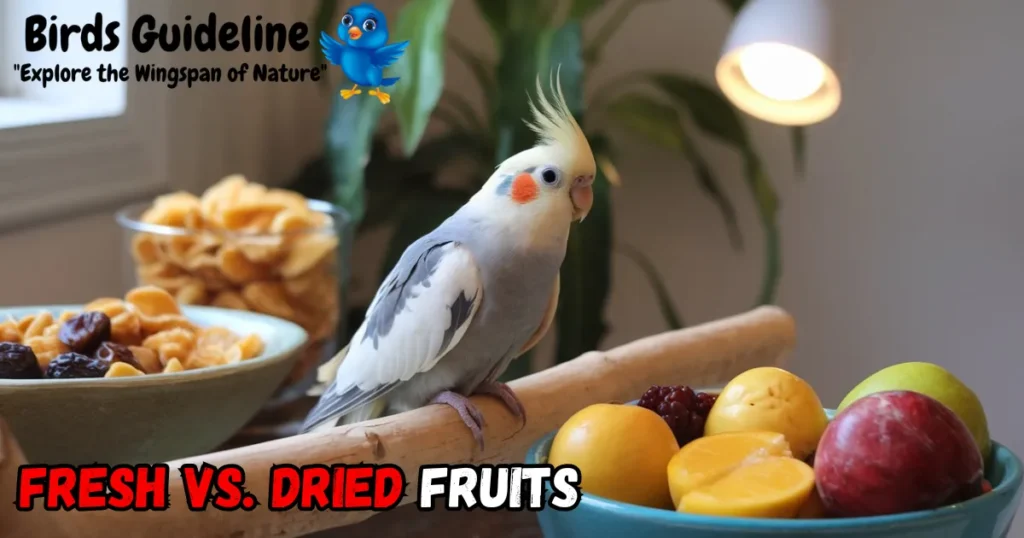
- Fresh fruits: More water content, less sugar per bite, more vitamin C.
- Dried fruits: Longer shelf life, higher in sugar, easy to overfeed.
Remember to wash fresh fruits well to remove pesticides. Offer dried fruits in moderation due to their higher sugar content.
Cutting Techniques
Cutting fruit in safe, bite-sized pieces is important. It guarantees your cockatiel can eat without choking. Soft fruits like berries can be given whole or halved. But, larger fruits need cutting into small chunks or thin slices. Avoid seeds and pits, as these can be toxic. Here’s a simple guide:
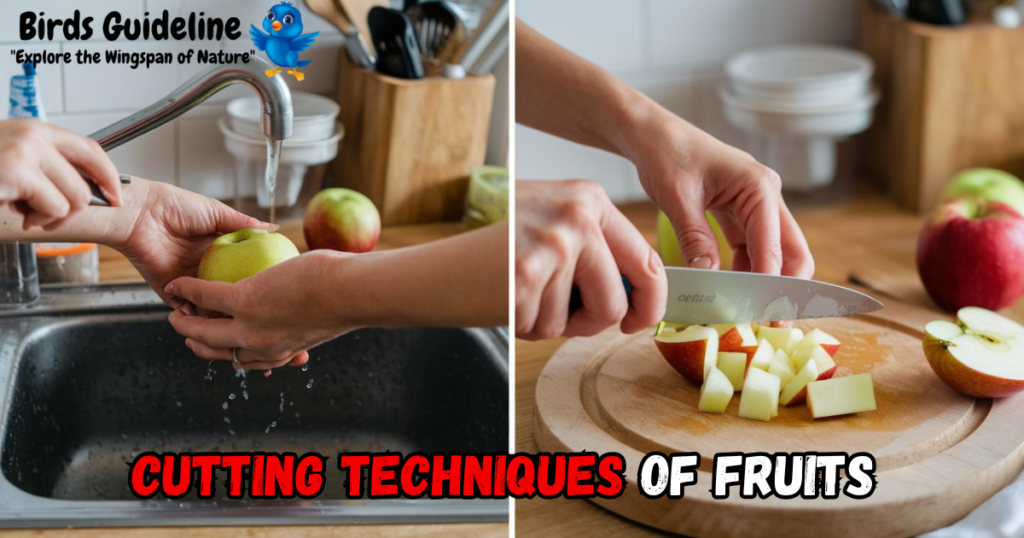
| Fruit Type | Recommended Cut |
|---|---|
| Apples | Small cubes or thin slices |
| Grapes | Halved or quartered |
| Bananas | Small slices or chunks |
Always supervise your cockatiel during feeding to guarantee safety.
Portion Sizes
Portion control is vital for a balanced diet. Fruits should be a treat, not a meal. Offer fruit portions that are no bigger than the size of your cockatiel’s head. This is enough for them to enjoy without overeating. A good rule is to offer fruit 2-3 times a week. Here’s a portion size guide for some common fruits:
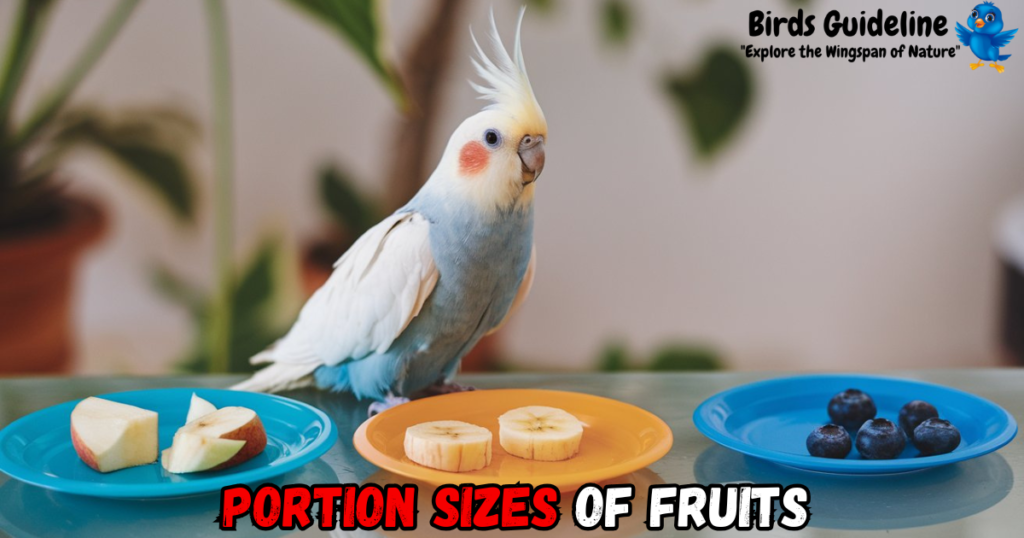
- Apple: 1-2 small cubes or slices
- Banana: 1-2 small slices or chunks
- Berries: 2-3 berries, depending on size
These portions will help keep your cockatiel healthy and happy.
Introducing New Fruits
Cockatiels love a variety of foods, especially fruits. Fruits provide essential vitamins and minerals that can contribute to a balanced diet. Yet, not all fruits are safe for these birds. It’s crucial to know which ones are healthy and enjoyable for your feathered friend. When adding new fruits to your cockatiel’s diet, it’s important to do so with care and attention.
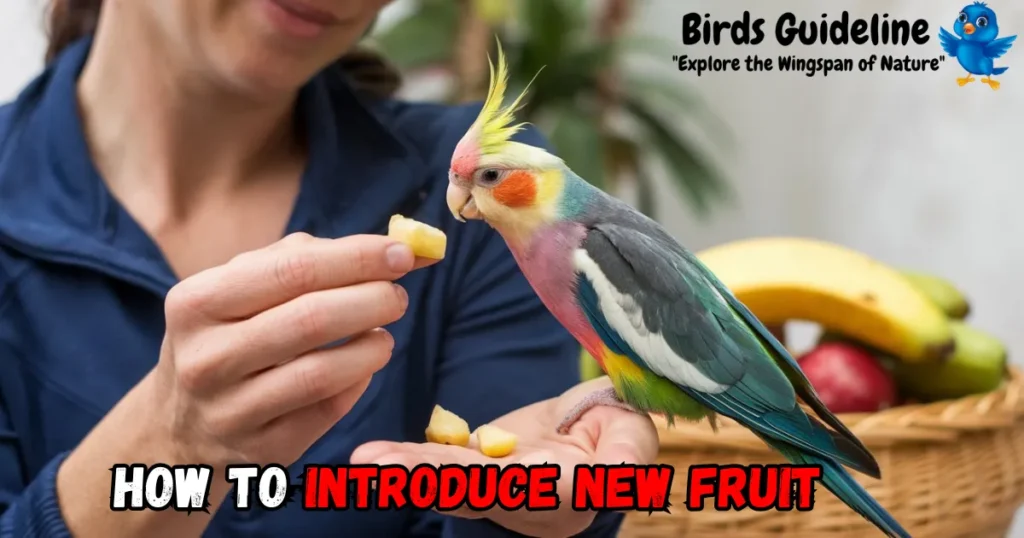
Gradual Introduction
Introducing new fruits to your cockatiel’s diet should be a slow process. Start with small pieces of one type of fruit. Observe your pet’s reaction to the new food. Cockatiels might be wary of new flavors and textures. Here are some steps to follow:
- Offer small pieces of fruit to avoid waste.
- Choose organic fruits when possible to reduce pesticide exposure.
- Wash all fruits thoroughly before serving.
- Remove any uneaten fruit after a few hours to prevent spoilage.
Signs Of Preference
Your cockatiel will show if it likes a fruit or not. Watch for these signs:
- Eager eating indicates they enjoy the fruit.
- Ignoring or tossing the fruit aside means they might not like it.
- Whistling or singing can be a sign of a happy bird enjoying their treat.
- Remember, each bird is unique. Preferences can vary widely.
Monitoring Reactions
It’s important to watch for any negative reactions. Some fruits might not sit well with your bird. Here’s what to look for:
- Changes in droppings could indicate a problem.
- Lack of energy or changes in behavior are important to note.
- Signs of digestive upset, such as regurgitation, need your vet’s attention.
- Always consult with a veterinarian if you notice any concerning changes.
Common Misconceptions
Owners often wonder about the best fruits for their cockatiels. There are common misconceptions about what these birds can eat. Not all fruits are suitable for cockatiels. Some might cause health issues. It’s important to know which fruits are safe. Cockatiels enjoy a variety of foods, but their diet needs balance. Let’s uncover the truths behind these misconceptions.
All Fruits Are Safe
Cockatiels can eat many fruits, but not all are safe. Some fruits contain toxins that can harm your feathered friend. For example, avocado is highly toxic to cockatiels. It’s important to research each fruit before feeding. Here is a list of safe fruits:
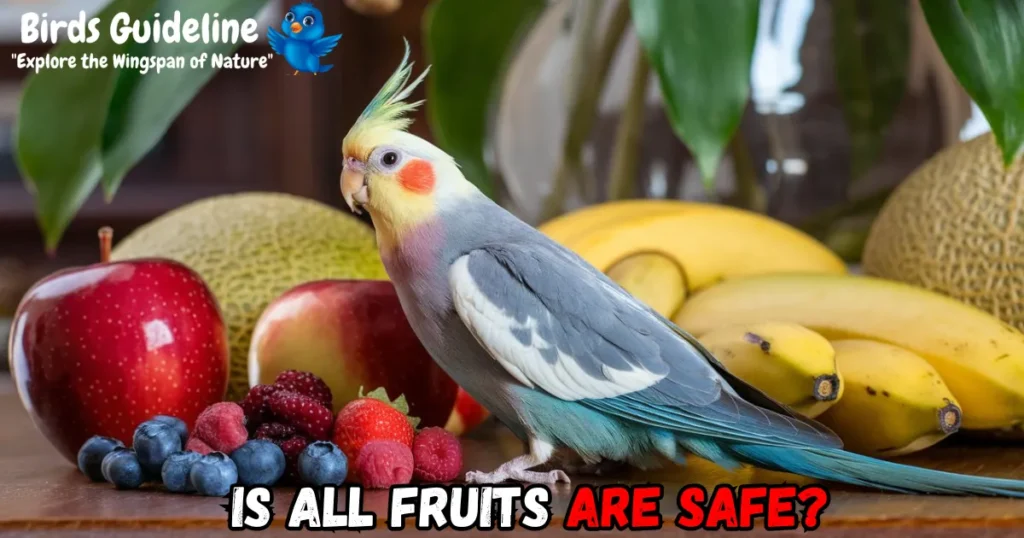
- Apples (without seeds)
- Bananas
- Berries (such as strawberries and blueberries)
- Melons (like cantaloupe and watermelon)
Make sure to remove seeds and pits from fruits. These can be dangerous for your cockatiel. Fruits should be served in small, manageable pieces. This prevents choking and promotes easy digestion.
Fruit As A Main Diet
Fruits are tasty treats for cockatiels but should not be the main part of their diet. A balanced diet includes pellets, vegetables, and grains. Fruits should only be a small portion. Here’s why:
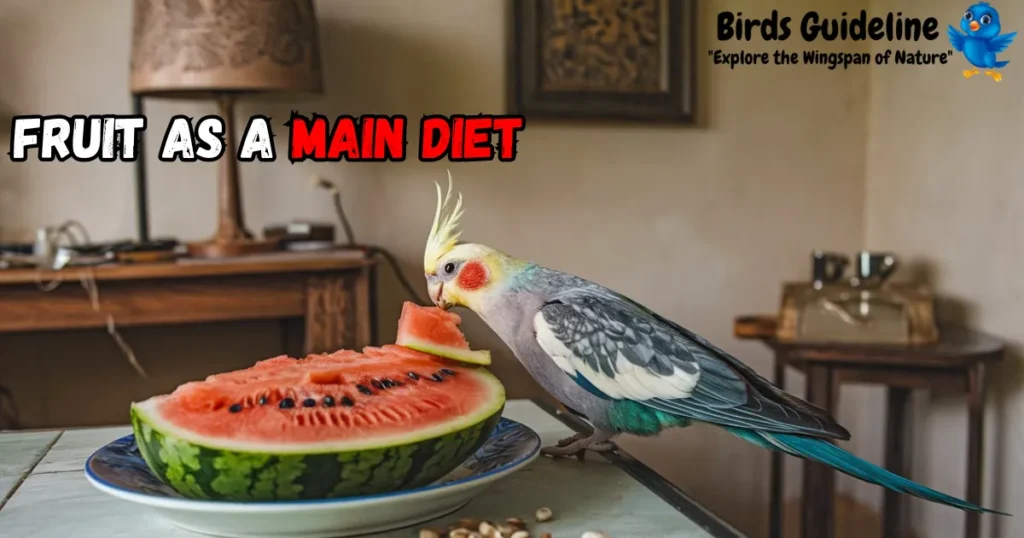
- Fruits have a lot of sugar which is not good for birds in large amounts.
- Cockatiels need protein and other nutrients that fruits don’t offer enough of.
- Too much fruit can lead to health problems like obesity or diabetes.
Think of fruits as special snacks. Offer them a few times a week, not every day. This keeps your cockatiel healthy and happy.
Organic Vs. Non-organic
Organic fruits are grown without harmful chemicals. This makes them a safer choice for your cockatiel. Non-organic fruits might have pesticide residues. These chemicals can be toxic to your bird. Here’s a comparison:
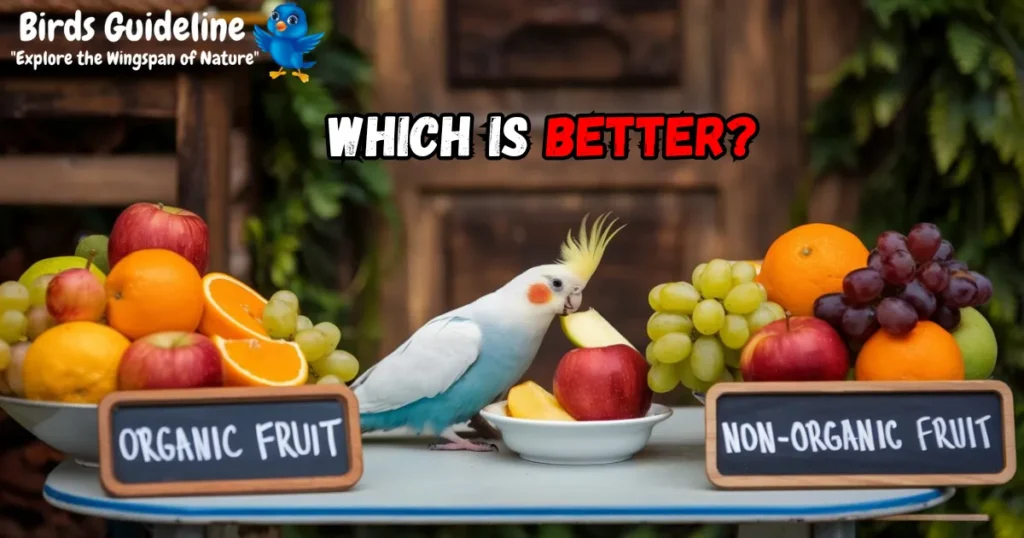
| Organic Fruits | Non-Organic Fruits |
|---|---|
| No pesticides | Possible chemical residues |
| Often fresher and tastier | May be less flavorful |
| More expensive | Usually cheaper |
Wash all fruits, whether organic or not. This helps remove any dirt or residues. Feeding your cockatiel the best fruits guarantees they live a long, healthy life.
Seasonal Fruit Choices
Understanding what fruits cockatiels can eat is important for their health. Cockatiels enjoy a variety of fruits, but not all are safe. Seasonal fruit choices guarantee variety and freshness. Let’s identify safe fruits for these birds during different seasons.
Summer Fruits
Summer is a great time for cockatiels to enjoy fresh fruits. Fruits like berries, melons, and stone fruits are in season. Here’s what you can offer:
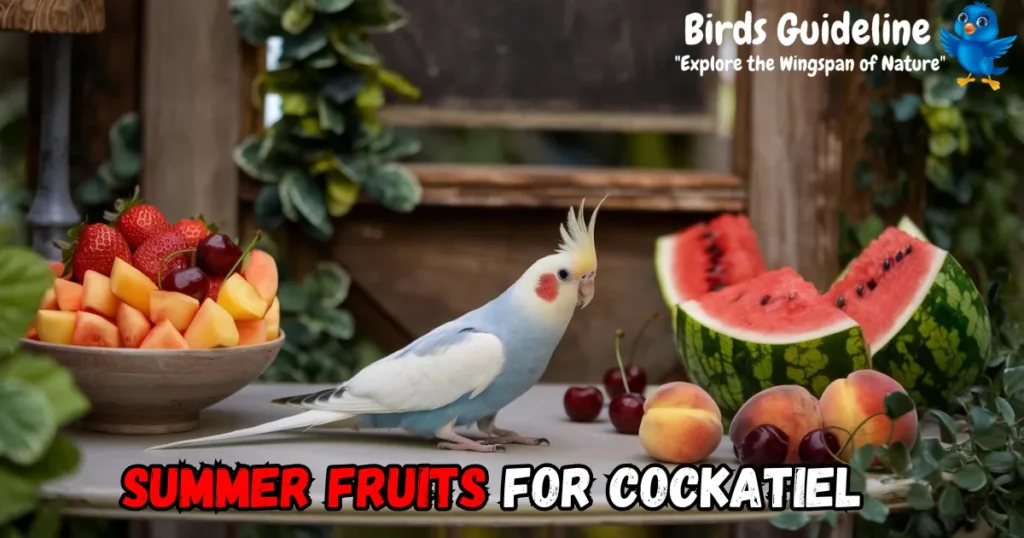
- Strawberries: Small pieces are perfect.
- Watermelon: Remove seeds; offer in moderation.
- Cherries: Always remove pits before serving.
- Peaches: Provide without the pit.
These fruits have lots of water and nutrients. Always wash fruits to remove pesticides. Cut them into small, manageable pieces. This helps prevent choking.
Winter Fruits
Winter can be challenging to find fresh fruits. Yet, some options are still available. Fruits like apples and pears can be found. These fruits should be served as follows:
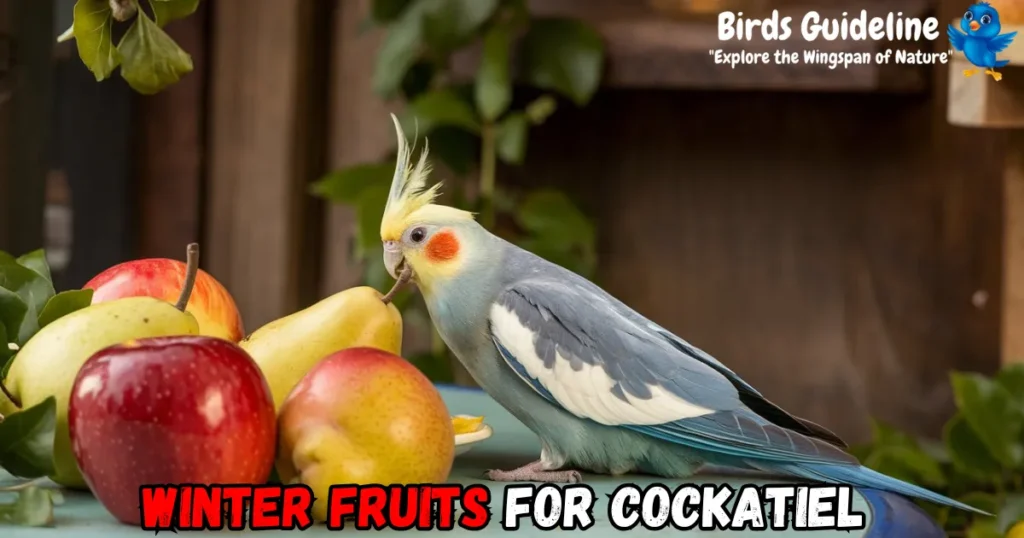
- Apples: Seedless and cut into small slices.
- Pears: Soft, ripe, and diced.
Citrus fruits such as oranges are also available. They are high in vitamin C. Give them in small amounts to avoid acidity. Remember to remove any seeds or pits.
Local Vs. Exotic
Choosing between local and exotic fruits is important. Local fruits are usually fresher and more nutritious. They have not traveled far. This means they retain more vitamins. Exotic fruits can be a treat. Yet, they may lack some nutrients due to long transport times. Consider these points:
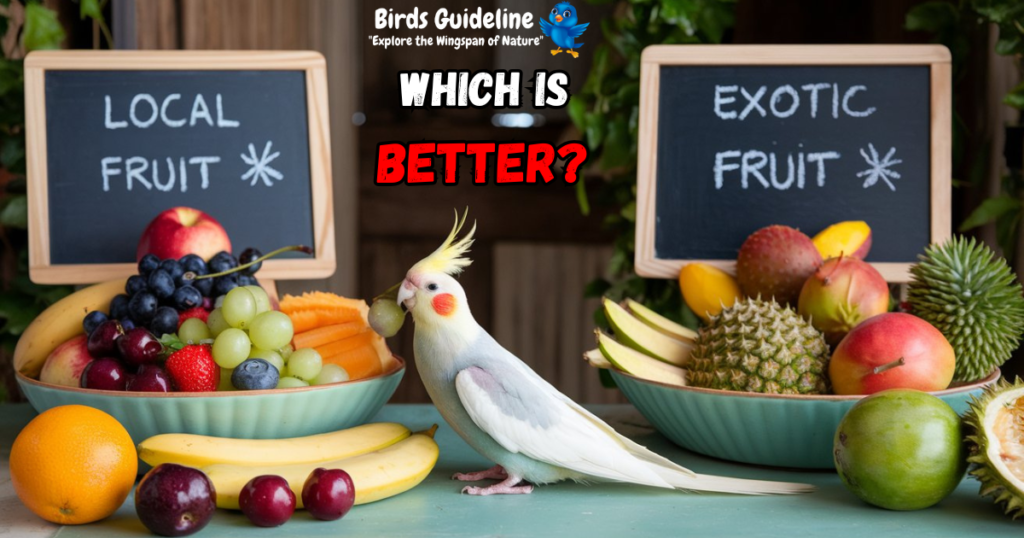
- Availability: Local fruits are often easier to find.
- Cost: Local fruits can be less expensive.
- Environment: Buying local supports local farmers and reduces carbon footprint.
Always introduce new fruits slowly. Watch for any signs of allergies or digestive issues. Your cockatiel’s diet should be varied and balanced. This includes seeds, pellets, vegetables, and fruits.
Homemade Fruit Treats
Cockatiels love a variety of fruits, which can be both nutritious and delicious treats. Understanding which fruits are safe and how to prepare them can lead to a happier, healthier bird. This guide will show you some fun and easy ways to create homemade fruit treats that your cockatiel will adore.
Fruit Skewers
Fruit skewers are a fun way to offer your cockatiel a tasty snack. They are easy to make. Just thread small pieces of cockatiel-safe fruits onto a skewer. Here’s a simple guide:
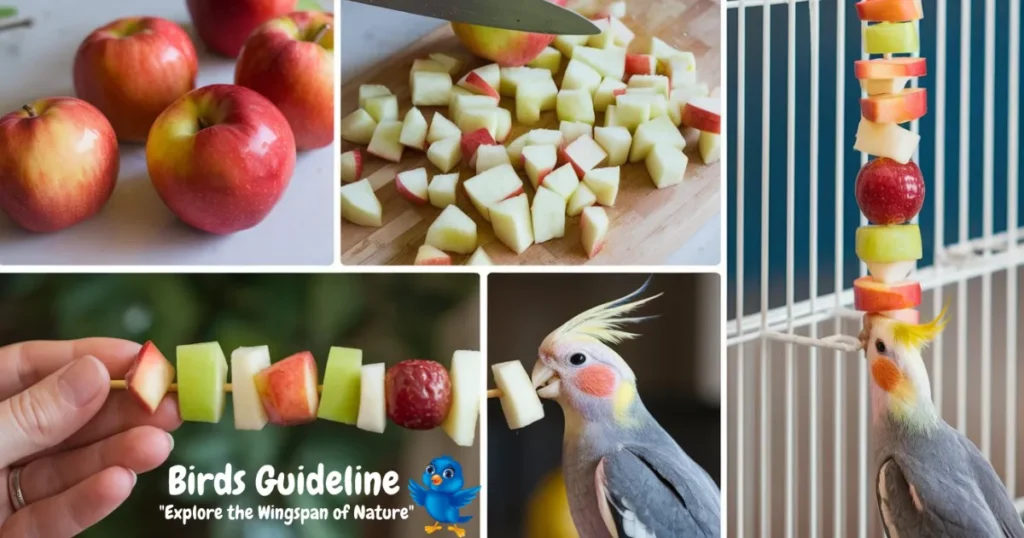
- Choose safe fruits like apples, pears, and berries.
- Wash all fruits thoroughly to remove pesticides.
- Cut fruits into small, bite-sized pieces.
- Use a clean skewer and thread the fruit pieces on.
- Hang the skewer in the cage for your bird to enjoy.
Remember to remove any uneaten fruits after a few hours to prevent spoilage.
Frozen Treats
Frozen treats are perfect for hot days. They keep your bird cool and entertained. Here is how to make them:
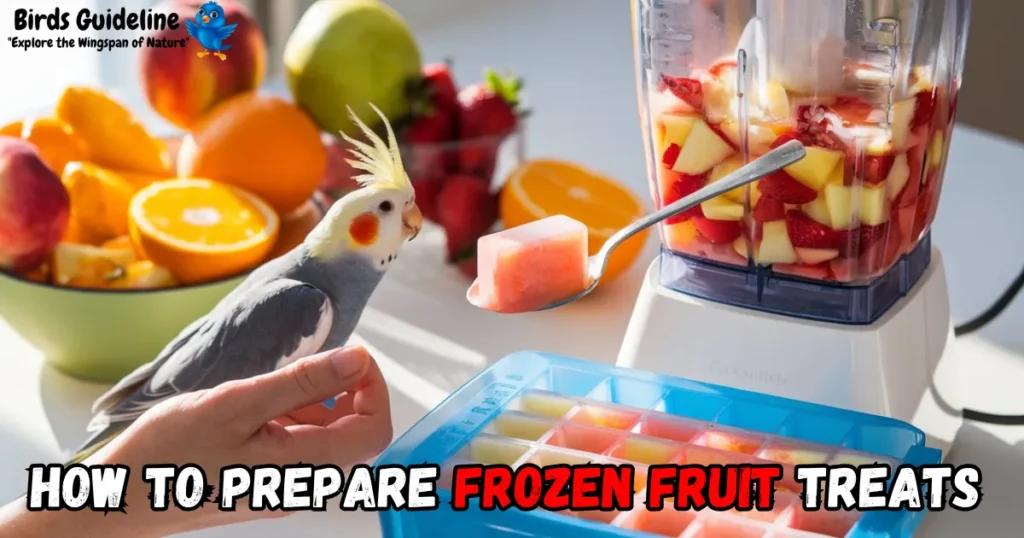
- Mash or puree some fruit that is safe for cockatiels.
- Pour the mix into an ice cube tray.
- Freeze until it is solid.
- Give one cube to your cockatiel on a hot day.
Only offer frozen treats in moderation to prevent digestive issues.
Fruit Salad Mixes
Fruit salad mixes are a tasty way to give your bird a variety of nutrients. Here’s how to make a safe and healthy fruit salad for your cockatiel:

- Select a mix of cockatiel-friendly fruits.
- Chop the fruits into small, manageable pieces.
- Mix the fruits together in a bowl.
- Serve a small portion to your bird as a treat.
Always remove any leftover salad after a couple of hours to keep the cage clean and fresh.
Frequently Asked Questions
What Fruits Can Cockatiels Not Eat?
Cockatiels should not eat avocado, chocolate, or fruit seeds and pits, as these can be toxic. Avoid feeding them caffeine or alcohol-containing foods. Stick to safe, recommended fruits for their diet.
Cockatiels enjoy a varied diet, but their favorite foods often include millet, sunflower seeds, and fresh vegetables. They also relish fruits like apples and berries.
Yes, cockatiels can safely enjoy whole strawberries, but remember to wash them thoroughly and remove the stems first. Serve in moderation as part of a varied diet.
Conclusion
Feeding your cockatiel a variety of fruits is crucial for their health and happiness. Remember, moderation and proper preparation are key. By incorporating safe fruits like apples, pears, and berries into their diet, you guarantee they receive essential nutrients. Always consult with a vet to tailor the best diet for your feathered friend.
Enjoy discovering new favorites together!

